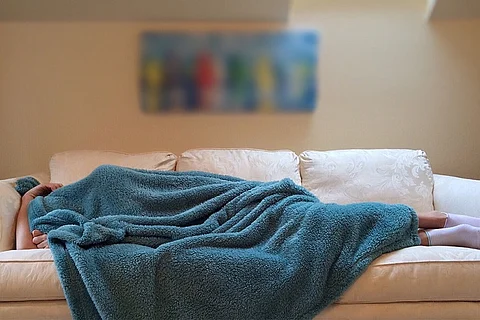

If you think the best way to relax and rejuvenate over the weekend is to get some extra sleep, a researcher at Sweden's Karolinska Institute has bad news for you.
It seems sleeping in late on weekends messes with your body's schedule and makes you feel more tired instead of making you feel fresher and rested.
"If you sleep a little bit too little all the time, and just catch up on the weekends, you are messing with your circadian rhythms, you should stay on a regular schedule, but that doesn’t really work with most people’s lives," psychologist and sleep researcher Susanna Jernelöv, told The Local.
"It’s partly because of our circadian rhythm, so when you sleep in later, it’s like giving yourself a bit of jet-lag and jet-lag makes you less bright and perky,” she added.
And Jernelöv is not the only researcher making this claim.
According to The Local report, Norwegian sleep researcher Bjørn Bjorvatn at the University of Bergen has also made similar observations.
"You should get up and go to bed at about the same time every day. Do not sleep in late on weekends. Do not have a lie in. If you get up at 12pm on the weekend, it will take time for your rhythm to adjust back," he told Norway's state broadcaster NRK.

A study conducted by researchers at the University of Pittsburgh last year found that disruptions caused to regular sleeping patterns is linked to an increased risk of metabolic diseases like heart diseases and diabetes.
The study said that "social jetlag as basic as getting up late may also be bad for health," UPI reported.
The report added, "Social jetlag refers to a mismatch between a person's socially-imposed sleep schedule and their natural circadian rhythm. Researchers said social jetlag is known to relate to obesity and other cardiovascular conditions, however the link to healthy people is new."
Another study found that sleeping longer on some days does not really compensate for sleeping for fewer hours on other days.
"Individuals who get too little sleep during the work or school week but try to catch up on weekends may not realize that they are accumulating a chronic sleep debt. This may lead to a dangerous situation in which individuals do not realize the extent of their sleep deprivation and their vulnerability to sudden sleepiness when they try to drive or work late into the night," Elizabeth Klerman, senior author of the paper and an Associate Professor in the Division of Sleep Medicine at Brigham and Women's Hospital (BWH) said.
Daniel Cohen, lead author of the paper and a researcher in the Division of Sleep Medicine at BWH explained that "Many people have a false sense of reassurance that they can quickly recover from a chronic sleep debt with just one or two days of good sleep.”
However, he said, the BWH study showed that this is because we fail to notice the signals that we’re suffering from sleep loss. “One long night of sleep can restore performance to normal levels for about six hours after waking, and the late afternoon and early evening alerting signal of the circadian rhythm can largely hide the effects of chronic sleep loss during the rest of a normal day," he explained
"However," he added, "the lingering effect of chronic sleep loss causes performance to deteriorate dramatically when these individuals stay awake for an extended period of time, for example when they try to pull an 'all-nighter'."